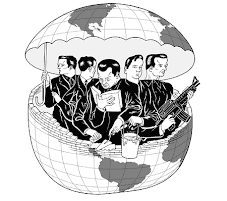Nov 20th 2008 | WASHINGTON, DC
From The Economist print edition
A bit of good news after a big summit
JUDGED by the hubristic promises that preceded it, the G20 meeting was bound to disappoint. The leaders of the world’s 20 biggest rich and emerging economies, gathered in Washington, DC, on November 15th, did not remake global finance—as some of them had set out to do. Nor, as others had hoped, did they come up with a co-ordinated fiscal boost to counter the deepening global downturn (though they talked of using fiscal measures “to rapid effect”).
And within days even some of their promises looked thin. The five-page communiqué included a solemn pledge that G20 countries would “refrain from raising new barriers” to trade and investment over the next twelve months. Two days later Russia’s government said it would raise tariffs on imported cars. On November 18th India slapped a 5% duty on a number of iron and steel products.
So was it all a waste of time? There are some reasons to think not. For one, this was the first time the leaders of this group of rich and emerging economies—which between them represent almost 90% of global GDP—had gathered for an economic summit. They have already scheduled a follow-up session before April 30th, and the old, rich-only G7 looks increasingly anachronistic.
Fortunately, the G20’s attitude to global finance seems realistic. The communiqué was not a grand manifesto but a pragmatic acknowledgment of the tension between a globalising capital market and national regulation. From the creation of colleges of financial supervisors to oversee the biggest cross-border financial institutions to the development of a single global accounting standard, the G20 leaders set out incremental reforms to the rules of global finance.
They also made clear that the governance of global financial institutions must change. The membership of the Financial Stability Forum, a group of regulators and central bankers charged with the technicalities of financial supervision, is to be broadened. The IMF and World Bank are to be “comprehensively” reformed. It is easy to be cynical. Talk about reforming power within the IMF has gone on for years. But with emerging economies now firmly at the top table of international finance, such an overhaul has become much more likely. Not a new Bretton Woods—but a decisive shift in the old order.
http://www.economist.com/finance/PrinterFriendly.cfm?story_id=12652239
Subscribe to:
Post Comments (Atom)
Rafael V. Mariano, chairperson of the Peasant Movement of the Philippines, 2000
Food has long been a political tool in US foreign policy. Twenty-five years ago USDA Secretary Earl Butz told the 1974 World Food Conference in Rome that food was a weapon, calling it 'one of the principal tools in our negotiating kit.' As far back as 1957 US Vice-President Hubert Humphrey told a US audience, "If you are looking for a way to get people to lean on you and to be dependent on you in terms of their cooperation with you, it seems to me that food dependence would be terrific."



No comments:
Post a Comment